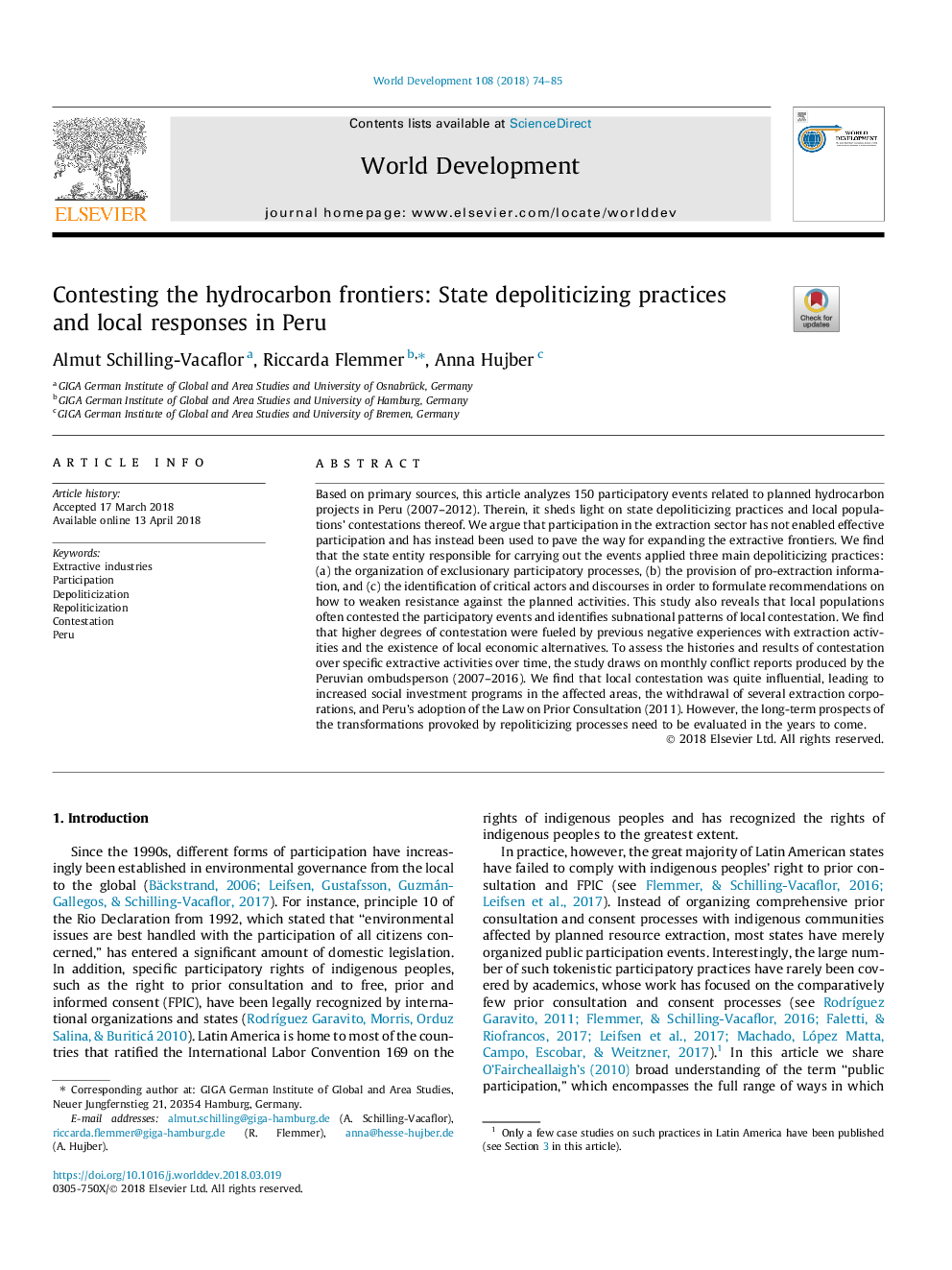| کد مقاله | کد نشریه | سال انتشار | مقاله انگلیسی | نسخه تمام متن |
|---|---|---|---|---|
| 7391691 | 1481110 | 2018 | 12 صفحه PDF | دانلود رایگان |
عنوان انگلیسی مقاله ISI
Contesting the hydrocarbon frontiers: State depoliticizing practices and local responses in Peru
ترجمه فارسی عنوان
مسابقات مرزهای هیدروکربن: شیوه های تجزیه طلبانه دولتی و پاسخ های محلی در پرو
دانلود مقاله + سفارش ترجمه
دانلود مقاله ISI انگلیسی
رایگان برای ایرانیان
کلمات کلیدی
ترجمه چکیده
بر اساس منابع اولیه، این مقاله 150 رویداد مشارکتی مربوط به پروژه های برنامه ریزی شده هیدروکربن در پرو (2007-2012) را بررسی می کند. در این صورت، این نکته را در مورد اعمال تخلفات دولتی و مخالفت های جمعیت محلی بیان می کند. ما استدلال می کنیم که مشارکت در بخش استخراج مشارکت موثر را تأمین نکرده است و به جای آن برای راه سازی برای گسترش مرزهای استخراج استفاده شده است. ما دریافتیم که نهاد دولتی مسئول اجرای حوادث، سه شیوه عمیق تر پوپولیتیزاسیون را اعمال کرد: (الف) سازماندهی فرآیندهای مشارکتی غیرقابل اجتناب، (ب) ارائه اطلاعات پیشگیرانه و (ج) شناسایی بازیگران و گفتمان انتقادی به منظور ارائه توصیه هایی در مورد چگونگی تضعیف مقاومت در برابر فعالیت های برنامه ریزی شده. این مطالعه همچنین نشان می دهد که جمعیت محلی اغلب رویدادهای مشارکتی را مورد سوء استفاده قرار می دهند و الگوهای مشارکت محلی را تشریح می کنند. ما دریافتیم که درجه بالاتر از رقابت با تجربیات منفی قبلی با فعالیت های استخراج و وجود جایگزین های اقتصادی محلی بوجود می آید. برای ارزیابی تاریخچه و نتایج رقابت در مورد فعالیت های خاص استخراج در طول زمان، این مطالعه براساس گزارش های ماهانه ای که در اختیار اوباما پرو (2007-2016) انجام می شود، می باشد. ما دریافتیم که رقابت محلی بسیار تاثیر گذار بود، منجر به افزایش برنامه های سرمایه گذاری اجتماعی در مناطق آسیب دیده، خروج چندین شرکت استخراج و تصویب قانون پروتکل مشاوره قبلی (2011) شد. با این حال، چشم انداز دراز مدت تحولات ناشی از تحولات فرآیند باید در سال های آینده مورد ارزیابی قرار گیرد.
موضوعات مرتبط
علوم انسانی و اجتماعی
اقتصاد، اقتصادسنجی و امور مالی
اقتصاد و اقتصادسنجی
چکیده انگلیسی
Based on primary sources, this article analyzes 150 participatory events related to planned hydrocarbon projects in Peru (2007-2012). Therein, it sheds light on state depoliticizing practices and local populations' contestations thereof. We argue that participation in the extraction sector has not enabled effective participation and has instead been used to pave the way for expanding the extractive frontiers. We find that the state entity responsible for carrying out the events applied three main depoliticizing practices: (a) the organization of exclusionary participatory processes, (b) the provision of pro-extraction information, and (c) the identification of critical actors and discourses in order to formulate recommendations on how to weaken resistance against the planned activities. This study also reveals that local populations often contested the participatory events and identifies subnational patterns of local contestation. We find that higher degrees of contestation were fueled by previous negative experiences with extraction activities and the existence of local economic alternatives. To assess the histories and results of contestation over specific extractive activities over time, the study draws on monthly conflict reports produced by the Peruvian ombudsperson (2007-2016). We find that local contestation was quite influential, leading to increased social investment programs in the affected areas, the withdrawal of several extraction corporations, and Peru's adoption of the Law on Prior Consultation (2011). However, the long-term prospects of the transformations provoked by repoliticizing processes need to be evaluated in the years to come.
ناشر
Database: Elsevier - ScienceDirect (ساینس دایرکت)
Journal: World Development - Volume 108, August 2018, Pages 74-85
Journal: World Development - Volume 108, August 2018, Pages 74-85
نویسندگان
Almut Schilling-Vacaflor, Riccarda Flemmer, Anna Hujber,
